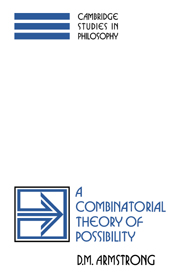Summary
What is put forward in this essay is a new version of the metaphysic of Logical Atomism. It is a Logical Atomism completely purged of semantic and epistemic atomism. The idea that one can reach the atoms by analysing meanings is utterly rejected. In general, it is not for philosophers to say what the fundamental constituents of the world are. That question is to be settled a posteriori. It is a question for total science.
The version of Logical Atomism put forward here even abstracts from the question of whether there are any atoms at all at the bottom of the world. That too is a question to be decided a posteriori, if it can be decided at all. In Chapter 5 I argue that Logical Atomism can still be sustained even if we never get past merely relative atoms.
But if there may be no genuine atoms, why continue to speak of Logical Atomism? I do so because, with a little qualification, the scheme presented cleaves to the fundamental idea that the states of affairs into which the world divides (Wittgenstein's and Russell's atomic facts) are logically independent of each other. Each one is, as I will say, ‘Hume distinct’ from every other.
This becomes the basis of what I think is a simple (and naturalistic) Combinatorial theory of possibility. In his article ‘Tractarian Nominalism’ Brian Skyrms sketches a metaphysics of facts (states of affairs, as I put it), facts having as constituents individuals and universals (the latter divided into properties and relations).
- Type
- Chapter
- Information
- A Combinatorial Theory of Possibility , pp. ix - xivPublisher: Cambridge University PressPrint publication year: 1989

